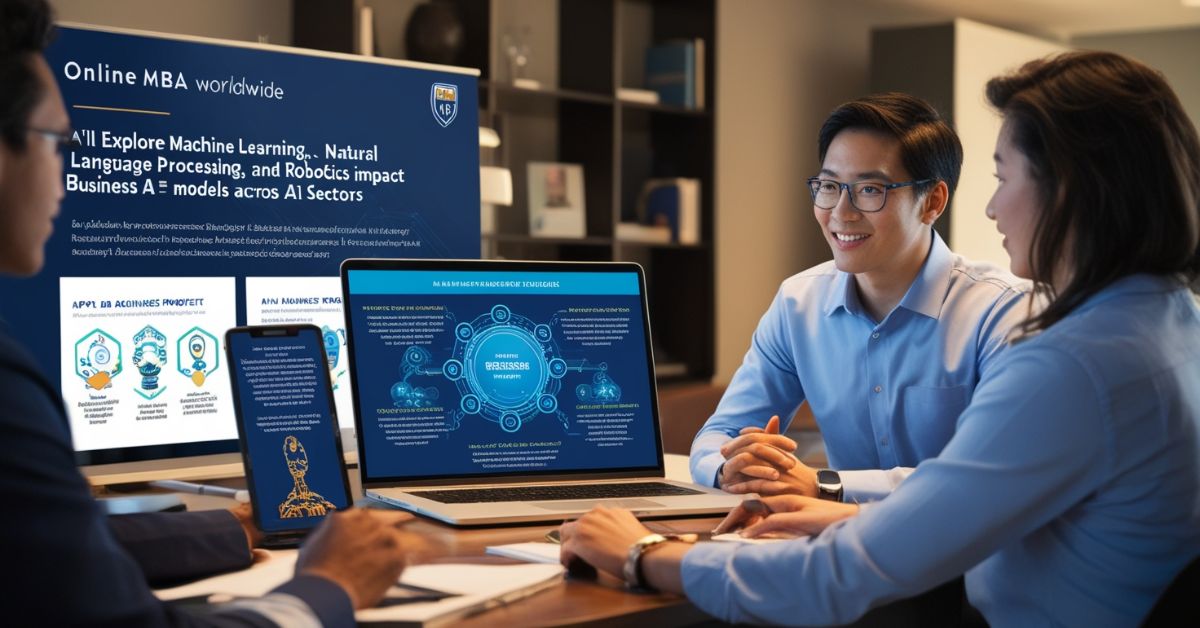AI in Online MBAs: Transforming Global Business Strategy Courses – The Future of Executive Education
Artificial intelligence is revolutionizing online MBA programs, particularly in global business strategy courses. Leading institutions now incorporate AI modules to prepare future leaders for an increasingly tech-driven business landscape. You’ll gain hands-on experience with AI applications in strategic decision-making, data analysis, and operational optimization through these cutting-edge programs.
As AI reshapes industries worldwide, online MBA curricula are evolving to meet new demands. You’ll explore how machine learning, natural language processing, and robotics impact business models across sectors. Case studies and real-world projects allow you to apply AI concepts to complex strategic challenges, enhancing your problem-solving skills.
By integrating AI into global business strategy courses, online MBAs equip you with the knowledge to leverage these technologies for competitive advantage. You’ll learn to identify AI-driven opportunities, manage implementation risks, and navigate ethical considerations. This AI-focused education prepares you to lead digital transformation initiatives and drive innovation in your future roles.
Leveraging AI for Strategic Business Transformation
AI is revolutionizing how businesses approach strategy and innovation. It offers powerful tools to gain competitive advantages and drive digital transformation across organizations.
Understanding AI in the Business Context
AI in business refers to using machine learning, data analytics, and automation to enhance decision-making and operations. You can apply AI to optimize processes, predict market trends, and personalize customer experiences. Key AI technologies include natural language processing, computer vision, and predictive analytics.
To integrate AI successfully, you need to:
- Identify specific business problems AI can solve
- Assess your data quality and infrastructure
- Develop AI literacy among your workforce
- Align AI initiatives with your overall business strategy
AI’s impact extends beyond efficiency gains. It can unlock new revenue streams and business models, transforming how you create and deliver value to customers.
Innovating with AI-Driven Solutions
AI-driven innovation can reshape your products, services, and business processes. You can use AI to:
- Automate routine tasks, freeing up resources for strategic initiatives
- Develop smart products that adapt to user behavior
- Create personalized marketing campaigns at scale
- Optimize supply chains and inventory management
To foster AI-driven innovation:
- Encourage cross-functional collaboration
- Invest in AI research and development
- Create a culture that embraces experimentation and learning
AI can also enhance your decision-making by providing data-driven insights and predictive analytics. This allows you to anticipate market changes and make proactive strategic choices.
Case Studies of AI in Business Strategy
UPS leverages AI to optimize delivery routes and reduce package theft. Their ORION system analyzes millions of data points to find the most efficient delivery paths, saving fuel and time.
Netflix uses AI algorithms to personalize content recommendations, resulting in improved customer engagement and retention. Their AI-powered system analyzes viewing habits and preferences to suggest relevant shows and movies.
Starbucks implemented an AI-driven loyalty program that tailors offers to individual customers. This personalized approach has increased customer spending and loyalty.
These examples demonstrate how AI can drive tangible business outcomes when integrated into core strategies. You can learn from these successes to identify AI opportunities within your own organization.
The Online MBA Experience with AI Integration
AI integration transforms online MBA programs like those offered by Quantic (see Quantic School of Business and Technology reviews), enhancing learning experiences and preparing students for the digital business landscape. You’ll gain cutting-edge skills while navigating complex ethical considerations.
Curriculum and Learning Experience Enhancement
AI tools revolutionize your online MBA experience. You’ll engage with interactive simulations and personalized learning paths tailored to your needs. Virtual assistants provide 24/7 support, answering questions and offering study tips.
Data science and machine learning modules become core components of your curriculum. You’ll analyze real-world business cases using AI-powered analytics tools. This hands-on approach deepens your understanding of AI applications in various industries.
Natural language processing enables seamless communication in global virtual teams. You’ll collaborate on projects using AI-enhanced platforms that facilitate idea sharing and decision-making across time zones.
Upskilling for the Digital Economy
Your AI-integrated MBA equips you with skills highly sought after in the job market. You’ll learn to leverage AI for strategic decision-making, process optimization, and innovation management.
Courses cover AI essentials for business, including predictive modeling and automation strategies. You’ll gain proficiency in using AI tools for market analysis, customer segmentation, and risk assessment.
Certificate programs from institutions like HBS Online and Carnegie Mellon complement your MBA, allowing you to showcase specialized AI skills on your LinkedIn profile. This combination makes you a valuable asset in the digital economy.
Navigating Ethical and Governance Challenges
As future business leaders, you’ll grapple with AI’s ethical implications. Your MBA program explores responsible AI deployment, addressing bias, privacy concerns, and transparency issues.
You’ll study AI governance frameworks and regulatory landscapes across different countries. This knowledge prepares you to develop and implement ethical AI policies in global organizations.
Case studies on AI failures and successes help you understand the importance of human oversight in AI-driven decision-making. You’ll learn to balance innovation with risk management and societal impact considerations.




